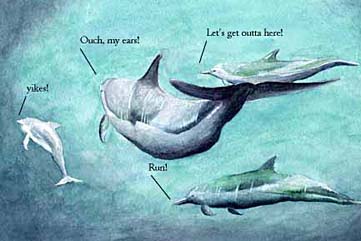
By KEVIN BOYD
Illustrations by ERIK PETERSENHumans are dumping a large volume of loud noise into the oceans every day. Is this noise harmful (or even toxic) to marine life?

Think about how annoying noise can be. If the droning, revving buzz of a leaf-blowing machine has ever ruined your concentration, or if a relentlessly-barking dog has ever kept you awake at night, then you know how disturbing, and almost maddening, noise pollution can be. What if a gardener wielding a leaf-blower posted himself outside your bedroom window and ran his machine for several hours every day? For marine life, noise from supertanker engines, seismic oil exploration, sonar, and other machines may be even more disturbing than the leaf blower would be to you.
Since the industrial age, humans have manufactured a cacophonous array of noisemakers louder than most natural ocean sounds. Some early studies of marine mammal hearing suggest that some species can hear many of our noises. But scientists don't know which noises most animals can hear, nor how much harm man-made noise inflicts.
With several laws, the US government has already outlawed human "harassment," of marine species, whether it's caused by noise or some other irritant. The 1972 Marine Mammal Protection Act prohibits molestation or disturbance of any marine mammal through "disruption of behavioral patterns including, migration, breathing, nursing, breeding, feeding or sheltering." The Endangered Species Act of 1973 provided for even stricter protection for any marine species designated as threatened or endangered, including: the sperm whale, the gray whale, the blue whale, the fin whale, the humpback whale, the right whale, the sei whale, the green sea turtle, and the leatherback sea turtle. Nearly all ocean noise research currently focuses on mammals, and pays virtually no attention to other creatures. But if noise pollution damages a fish or plankton population, then any larger creatures that feed on that species may decline as well. One of the few biologists who studies fish hearing, Art Popper, a professor of Biology at the University of Maryland - College Park, says there are almost no studies of the effect of noise on fishes. "I can count all the papers that have been published on one hand, and my name's on every one of them," he said.
Apart from a few shark attacks and jellyfish stings, ocean creatures are polite neighbors to the human race. Because we know little about how noise affects marine life, our laws (not to mention courtesy and common sense) demand that we control noise pollution more carefully until we learn more.
A.T.O.C. (Acoustic Thermometry of Ocean Climate)
Global warming experiment shifts focus to marine mammals
What noises do marine animals HEAR?
The effects of ocean noise pollution on marine life depend on what sounds they can hear
SOURCES OF NOISE
Since the industrial age, man-made ocean noise has increased steadily; and we're creating new noisemakers all the time.
EFFECTS OF NOISE
If marine animals do hear loud man-made noises, do these noises affect them?



